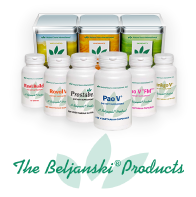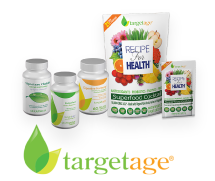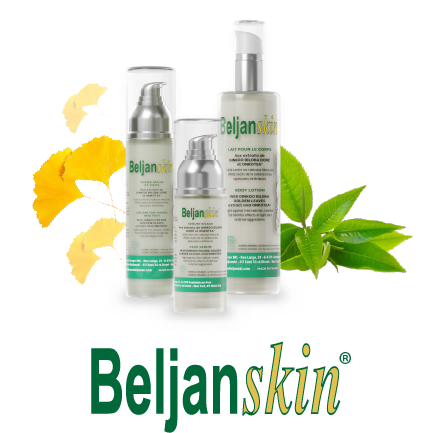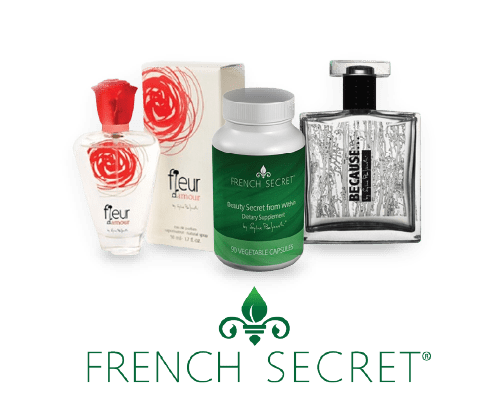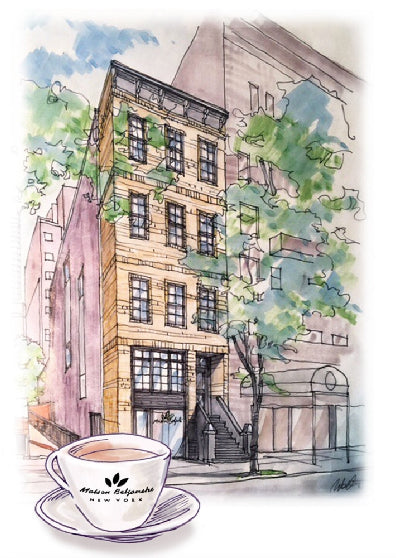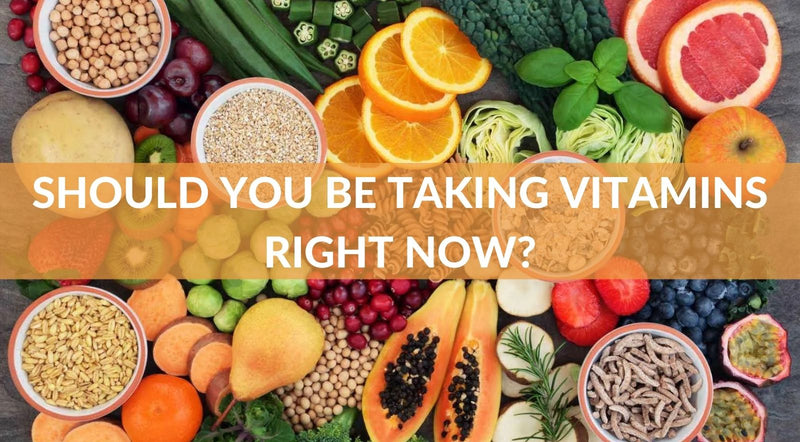
Should You Be Taking Vitamins Right Now?
With COVID-19, life and business has changed over the last few months. We are in uncharted territory, trying to cope with stress. Stress is the body's natural reaction to threatening situations, whether they’re real or perceived.
A series of chemical reactions occurs in your body, that may affect all aspects of your life, including your emotions, behaviors, thinking ability, and physical health. No part of the body is immune, including the immune system. When we’re stressed, the immune system’s ability to fight off antigens is reduced. And this is even reinforced by the bad habits we tend to develop as coping mechanisms (i.e. smoking, binge drinking, poor diet, lack of exercise, lack of sleep etc.).
That is why we are more susceptible to the disease.
In these difficult times, more than ever, we need to avoid bad habits and focus on boosting our immune system. Start with quality food. Fresh, preferably whole, unprocessed or minimally processed plant foods help to provide all-important vitamins and phytonutrients. Add plenty of fresh herbs (i.e. garlic, rosemary, sage, oregano) and spices (i.e. turmeric, black pepper, saffron) to add anti-inflammatory benefits.
Unfortunately, nowadays we have to consider that good food is just not going to do enough for our immune system. In a world where food is irradiated, milk pasteurized, genes modified, water is contaminated, and the air is poisoned, it is hard to get enough nutrients from the diet alone. We need vitamin support.
Multivitamins are extremely popular; however, do not expect a vitamin made of synthetic nutrients (usually made artificially, in an industrial process, often in China) be the same as a vitamin made of natural ingredients (that is made from concentrated, dehydrated whole foods). The majority of supplements (including vitamins, antioxidants, minerals and amino acids) available on the market today are made artificially, and many view synthetic nutrients as being almost chemically identical to those found in food. However, despite their similar structure, synthetic nutrients may trigger different reactions from your body, and it is unclear how well synthetic nutrients are actually absorbed, since they lack the minerals, cofactors and enzymes that come with natural nutrients and allow for optimal use by the body. That disparity of origins could explain the differences in results obtained in clinical studies: some observational studies have found multivitamin use to be associated with a lower risk of heart disease and cancer, while others have found an increased cancer risk. (1)
Additionally, synthetic vitamins can be subject to contamination, adulteration, and, because they are extremely concentrated, dosage issue: vitamins C and B, which are water-soluble, will be safely flushed out through urine, if taken in excess, but fat-soluble vitamins (like vitamins A, D, E, and K) may be trapped in the body and cause damage. For example, pregnant women are advised to be careful with their Vitamin A intake, as excess amounts have been linked to birth defects. (2)
Proper Vitamin Intake Is Beneficial
When taken properly, vitamins have shown to have real benefits, some of them that could help us with the up-to-the minute fight against the coronavirus (COVID-19).
A 2019 review article published in the European Journal of Microbiology and Immunology reports that the “potent antioxidant, immunomodulatory, and anti-infectious effects of Vitamin C have been known since the 1930s” and that Vitamin C has antimicrobial, antibacterial, antiviral, anti-parasitic and antifungal properties. Most recently, The Shanghai government announced its official recommendation that COVID-19 should be treated with high doses of Vitamin C, from 4000 to 16,000 mg per day administered by IV. According to Dr. Richard Cheng, a US board-certified specialist in anti-aging medicine reporting from China, “Early and sufficiently large doses of intravenous Vitamin C are critical. Vitamin C is not only a prototypical antioxidant, but also involved in virus killing and prevention of viral replication.”
As for Vitamin D, it has been linked to numerous benefits related to cancer, bone health and brain function, to name a few. (3) About 15 minutes of sun exposure per day is what many experts say is sufficient for Vitamin D3 intake. But this vague recommendation does not take into account how much skin is being covered by clothing or sunscreen (it has been reported that an SPF of 30 can reduce the body’s ability to synthesize vitamin D by 95%). Those with darker skin may need double or triple the sun exposure to synthesize the same amount of Vitamin D, as melanin inhibits the vitamin’s production. They may be therefore at an even greater risk of suffering from Vitamin D deficiency. As many of us are staying home nowadays and lacking the sunshine exposure needed to produce enough vitamin D to cover our needs, Vitamin D deficiency could lead to a greater risk of getting infected (specifically respiratory infections) from the coronavirus. (4) The lower level of infection now seen in Florida and California could actually been linked to a higher level of Vitamin D3 resulting from greater exposure to sunshine. The Irish Medical Journal is now recommending Vitamin D supplementation for those who are most at risk, namely those in hospitals, nursing homes, or generally speaking, our elderly population. Public health guidelines in England state that people at risk of Vitamin D deficiency (meaning everybody who stays at home nowadays) should take a 10 microgram supplement of Vitamin D all year around. In the US, researchers studying patients who have already been infected with the coronavirus have recommended a very high dose of Vitamin D for the first few weeks of infection (10,000IU/day).
A useful tip: beware that washing our hands many, many, times a day can make the skin become very dry and cracked. The dryness due to compulsive washing could prevent the proper diagnosis of Vitamin D deficiency. Indeed, one of the most prominent signs of Vitamin D deficiency is severe dryness of the skin. Use a moisturizer to prevent dryness due to soap.
How Probiotics & Nucleotides Help Us Stay Healthy
Beside vitamins, probiotics and nucleotides are the best dietary supplements to help us stay healthy during these times.
Indeed maintaining health is impossible without the proper gut microbiome. A good source of probiotics and digestive enzymes will play an essential role in maintaining proper immune defense and resilience.
Finally, think about Nucleotides. Nucleotides, although little known, are the basic building blocks of DNA and RNA. They are fundamental to all life, as every new cell requires nucleotides. Food rich in nucleotides are organ meats and offal, as well as in fermented foods, such as properly fermented tofu, tempeh and natto. They are considered “essential nutrients” whose depletion may prevent proper immune response. (5)
All these supplements work and should be considered not only while we are staying at home, but as needed on a regular basis.
Let’s try to make the most of those times and kick start some good habits.
References
1. Am J Epidemiol. 2000 Jul 15;152(2):149-62. Multivitamin use and mortality in a large prospective study. Watkins ML1, Erickson JD, Thun MJ, Mulinare J, Heath CW Jr.
2. N Engl J Med. 1995 Nov 23;333(21):1369-73. Teratogenicity of high vitamin A intake. Rothman KJ1, Moore LL, Singer MR, Nguyen US, Mannino S, Milunsky A.
3. BMJ. 2014 Apr 1;348:g2035. doi: 10.1136/bmj.g2035. Vitamin D and multiple health outcomes: umbrella review of systematic reviews and meta-analyses of observational studies and randomised trials. Theodoratou E1, Tzoulaki I, Zgaga L, Ioannidis JP.
4. Zhang, L, Liu, Y. Potential interventions for novel coronavirus in China: A systematic review. J Med Virol. 2020; 92: 479– 490
5. https://www.beljanski.org/engl/biography-mirko-beljanski-phd/immunity/
